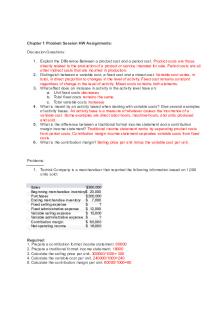ACC 220 Course Outline - Summary Accounting PDF

| Title | ACC 220 Course Outline - Summary Accounting |
|---|---|
| Author | Farouq Awodun |
| Course | Accounting |
| Institution | University of Lagos |
| Pages | 2 |
| File Size | 49 KB |
| File Type | |
| Total Downloads | 42 |
| Total Views | 194 |
Summary
Course outline...
Description
University of Lagos Faculty of Business Administration Department of Accounting Course Title: Cost Accounting Course Code: ACC 220 Introduction i.
Course Description Description: The course focuses on a global view of cost accounting; it is designed for students taking cost accounting for the first time. The course takes both a practical and theoretical approach. Cost accounting provides key data to managers for planning and controlling, as well as data on costing products, services, and customers. By focusing on basic concepts, analyses, uses, and procedures instead of procedures alone, cost accounting is recognized as a managerial tool.
ii.
Learning Experience Experience: The learning experience will include lectures, discussion classes, problem solving classes, self-study problems, through in-class and electronic-class learning, group work and individual work.
iii.
Objective Objective: To develop the candidate’s knowledge of costing techniques and methods.
iv.
Examination/Continuous Assessm Assessment ent ent: The student will be examined/assessed in theory and its application. Examination question may consist of multiple choices, short and long problems. The student is responsible for all materials covered in the course content.
Course Content 1.0
Nature and Scope of Cost Accounting Accounting: Concept and objectives; distinction between cost accounting and financial accounting; nature of cost accounting and costing terms; the role of cost accounting in management; the purpose of cost accounting information; the scope of cost accounting.
2.0
Cost Classification and Estimation Estimation: The nature; the purpose of cost classification; methods of cost classification; difference between costing method and costing technique; elements of cost (manufacturing, sales/marketing/distribution, administrative costs).
3.0
Marginal and Absorption Costing Costing: Nature; distinction between marginal and absorption costing; valuation of products under marginal and absorption costing; preparation of marginal and absorption statements; cost of production and profit determination; reconciliation of marginal profits and absorption profits.
4.0
Application of Marginal Costing Costing: The concept; break-even analysis; break-even analysis and charts (single product); importance and assumptions; application of cost-volume
profit relationship; different types of problems (with special emphasis on decision making problems); taxation in cost-volume-profit relationship. Costing for Materials and Cont Control rol rol: The nature; ordering; receiving; inspection; storage
5.0
and issue procedures, documents involved in stores routine; perpetual inventory records; continuous stock taking and treatment of discrepancies; method of pricing stores issues (FIFO, LIFO, average cost) and effect on reported profits; maximum stock, minimum stock and re-order levels; economic ordering quantity (EOQ) model. Standard Costi Costing ng ng: The nature; types of standards; principles of setting standards;
6.0
standard cost card; behavioural aspects of standard costing; generation of standard cost information; the relationship between standard costing and budget; direct cost variances; (direct material variances, direct labour variances); when to investigate variances; reconciliation of actual cost with standard costs. Costing for Overhead Overhead: The nature; main sources of total overheads (including
7.0
depreciation); using a fixed assets registers; use of production and service cost centres; allocation; apportionment; re-apportionment of service cost centres, basis for and calculation of absorption rates; use of absorption rates, under or over absorption. Costing for Labour Labour: The nature; time and output records; methods of remuneration and
8.0
effect on unit cost; payroll preparation and wages analysis; treatment of overtime premium, shift premium and idle time. Job/ Batc Batching hing Costin Costing g: The nature; quotes; time and materials; direct costs; indirect
9.0
costs. 10.0
Contemporary Issues in Cost Accountin Accounting. g.
Course Books/ Materials 1. Cost Accounting Module, Distance Learning Institute (DLI), University of Lagos. 2. Horgren, C. T.; Datar, S. M. & Foster, G. (2003). Cost Accounting. A Managerial Emphasis. (12th Edition), London, Prentice-Hall. 3. Lucey, T. (2007), Costing, (6th Edition), London BookPower. 4. Omolehinwa, E. O. (2013). Coping With Cost Accounting, Lagos Pumark. 5. The Institute of Chartered Accountants of Nigeria (ICAN) (2006). Intermediate Cost
Accounting, Lagos, VI Publishers. 6. Alfred, D. D. (2011). Cost Accounting. Lagos, High Rise Associate Ventures. 7. Any other Standard Textbooks or Course Material on Cost Accounting....
Similar Free PDFs

ACC 101 - COURSE OUTLINE
- 23 Pages

CMNS Course Outline 220-03
- 11 Pages

Course outline - coures summary
- 11 Pages

Chapter 1 Accounting 220
- 3 Pages

Intermediate Accounting In Acc
- 171 Pages

Course Outline
- 13 Pages

Course Outline
- 26 Pages

Course Outline
- 13 Pages

Course outline
- 2 Pages

Course outline
- 14 Pages

Course outline
- 3 Pages

Course Outline
- 22 Pages

Course Outline
- 22 Pages
Popular Institutions
- Tinajero National High School - Annex
- Politeknik Caltex Riau
- Yokohama City University
- SGT University
- University of Al-Qadisiyah
- Divine Word College of Vigan
- Techniek College Rotterdam
- Universidade de Santiago
- Universiti Teknologi MARA Cawangan Johor Kampus Pasir Gudang
- Poltekkes Kemenkes Yogyakarta
- Baguio City National High School
- Colegio san marcos
- preparatoria uno
- Centro de Bachillerato Tecnológico Industrial y de Servicios No. 107
- Dalian Maritime University
- Quang Trung Secondary School
- Colegio Tecnológico en Informática
- Corporación Regional de Educación Superior
- Grupo CEDVA
- Dar Al Uloom University
- Centro de Estudios Preuniversitarios de la Universidad Nacional de Ingeniería
- 上智大学
- Aakash International School, Nuna Majara
- San Felipe Neri Catholic School
- Kang Chiao International School - New Taipei City
- Misamis Occidental National High School
- Institución Educativa Escuela Normal Juan Ladrilleros
- Kolehiyo ng Pantukan
- Batanes State College
- Instituto Continental
- Sekolah Menengah Kejuruan Kesehatan Kaltara (Tarakan)
- Colegio de La Inmaculada Concepcion - Cebu


